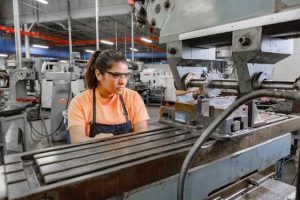(RED OAK, Texas) – Some Johnson County college students are looking to Texas State Technical College to shape their futures. During the fall semester, more than 60 county residents are attending TSTC’s campuses in North Texas, Marshall, Sweetwater and Waco.
“The hiring potential in the Dallas-Fort Worth, Ellis County and Johnson County areas is increasing as the economy opens back up,” said Lyle Guinn, an instructor in TSTC’s Precision Machining Technology program at the North Texas campus. “The older generation is retiring, and companies are looking for competent, qualified people to fill the void left by those retirements.”
TSTC is viewed as an asset for Cleburne’s economic development.
“It certainly helps as a recruiting tool when we recruit a new manufacturing or industrial business in Cleburne that is looking for a highly skilled workforce,” said Grady Easdon, the city of Cleburne’s economic development manager. “It is an outstanding recruiting tool for us.”
Triangle Pump Components Inc. in Cleburne gets less than three-quarters of its business from petroleum-based customers. The majority of the company’s employees are machinists, said Sam Kelton, Triangle’s vice president and general manager.
“Machinists with the skill set and experience we look for were more difficult to find before the pandemic,” Kelton said. “Since the pandemic started, many DFW-area companies that employ machinists have experienced layoffs.”
Kelton said machinists need good computer programming, mathematics and spatial reasoning skills.
“The job is both challenging and interesting,” he said. “Machinists are usually very intelligent and creative thinkers. Machining work will hold one’s interest and be motivating at the same time, while being hands-on at the same time.”
Kelton said he is confident the demand for future machinists will grow in the future but more people need to pursue the industry.
“Our business is structured to withstand the volatile swings in the oil industry,” he said. “The pandemic added an additional challenge we have not seen before. Businesses must be more creative and adaptable now than anytime I have seen in over 40 years of management.”
Sachem Inc., which is headquartered in Austin and has a facility in Cleburne, is a private chemical science company specializing in high-performance and high-purity products and services for the agrochemical, biotechnology, oil field and pharmaceutical industries.
Katie Cash, the company’s senior human resources manager in Austin, said the company frequently hires chemical operators on a temp-to-hire basis.
“We are a 24-hour, seven-days-a-week facility, and the production department where this role is works on a rotating swing shift, which is a mix of days and nights,” Cash said. “It can be a challenge to find individuals who can work this type of schedule. Some love it because it affords a string of days off on a regular basis. The operator, who technically starts as a packager, is involved in filling totes of product, monitoring tanks and processes, and preparing the product for shipping.”
Cash said the company also occasionally has maintenance and shipping jobs to fill.
“We tend to hire applicants who have some work experience in manufacturing environments. Some have forklift experience but are willing to train if not, and all have energy, drive and motivation and are reliable to come to work on time,” she said.
For Cleburne to have the workers for the future, students need to be inspired now.
Eighth grade students in the Cleburne Independent School District take a college and career readiness course in which they build a personal graduation plan for high school.
“The sooner we can get laser-focused toward a pathway, it shows graduation rates are higher and dropout rates are lower,” said Mark McClure, the Cleburne school district’s career and technical education director.
Cleburne’s high school students in the health science pathway have the opportunity to earn pharmacy technician or registered dental assistant certifications, while students in the diesel technician program do internships at local businesses before they graduate.
“What we are doing is forecasting future jobs,” McClure said. “They say about 75 percent of the jobs today’s third graders will have haven’t even been invented yet.”
For more information on Texas State Technical College, go to tstc.edu.
